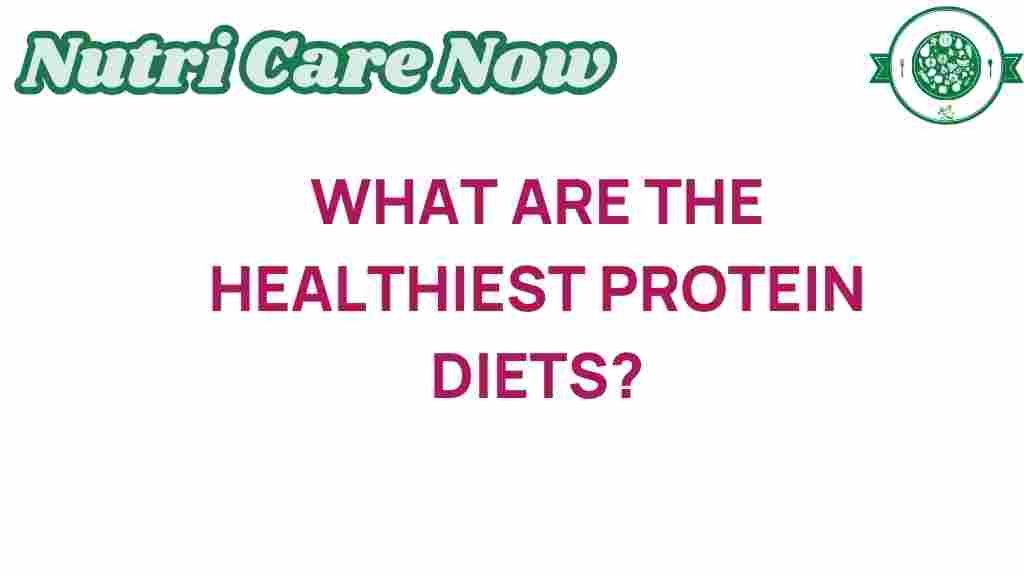Unpacking the Healthiest Protein Diets: What You Need to Know About Protein Diets
In today’s fast-paced world, maintaining a balanced diet is essential for overall health and wellness. One of the key components of a healthy eating plan is protein. Understanding protein diets can help you make informed dietary choices that align with your fitness goals and promote well-being. In this article, we will explore various protein diets, their health benefits, protein sources, and tips for effective meal planning.
What Are Protein Diets?
Protein diets emphasize the consumption of protein-rich foods and limit carbohydrates and fats. These diets are designed to help individuals achieve specific health and fitness goals, such as weight loss, muscle gain, or improved athletic performance. Common protein diets include:
- Keto Diet: High in fats, moderate in protein, and very low in carbohydrates.
- Paleo Diet: Focuses on whole foods similar to those eaten during the Paleolithic era, emphasizing lean proteins.
- Atkins Diet: A low-carb diet that encourages high protein intake.
- Vegetarian and Vegan Diets: Plant-based diets that can also be rich in protein through the right food choices.
- Bodybuilding Diets: High protein intake to support muscle recovery and growth.
The Importance of Protein in Healthy Eating
Protein plays a crucial role in our bodies, contributing to various functions, including:
- Muscle Repair and Growth: Essential for athletes and those engaging in regular physical activity.
- Weight Management: Aids in satiety, helping to control hunger and reduce overall calorie intake.
- Hormone Production: Supports the production of enzymes and hormones necessary for bodily functions.
- Immune Function: Helps in the formation of antibodies that fight infections.
Choosing the Right Protein Sources
When planning a protein diet, it’s essential to choose healthy protein sources. Here are some excellent options:
- Lean Meats: Chicken breast, turkey, and lean cuts of beef.
- Fish: Salmon, tuna, and mackerel are rich in omega-3 fatty acids.
- Eggs: A complete protein source containing essential amino acids.
- Dairy Products: Greek yogurt and cottage cheese provide protein and probiotics.
- Legumes: Beans, lentils, and chickpeas are great plant-based protein sources.
- Nuts and Seeds: Almonds, chia seeds, and hemp seeds offer protein along with healthy fats.
- Protein Powders: Whey, casein, or plant-based protein powders for convenient supplementation.
Health Benefits of Protein Diets
Incorporating adequate protein into your diet can lead to numerous health benefits, including:
- Improved Muscle Mass: Essential for those looking to build or maintain muscle.
- Enhanced Weight Loss: Protein-rich diets can help shed excess fat while preserving lean muscle.
- Better Metabolic Health: Protein has a high thermic effect, promoting calorie burning.
- Stable Blood Sugar Levels: Helps prevent spikes in blood sugar, which can lead to cravings.
- Increased Energy Levels: A well-balanced protein intake can help sustain energy throughout the day.
Meal Planning for Protein Diets
Effective meal planning is crucial for success on a protein diet. Here are some steps to consider:
Step 1: Determine Your Protein Needs
Your protein requirements depend on factors such as age, gender, activity level, and fitness goals. A general guideline is:
- For sedentary adults: 0.8 grams of protein per kilogram of body weight.
- For active individuals: 1.2 to 2.0 grams of protein per kilogram of body weight.
Step 2: Create a Balanced Meal Plan
Include a variety of protein sources in your meal plan. Here’s an example of a day’s worth of meals:
- Breakfast: Scrambled eggs with spinach and feta cheese.
- Snack: Greek yogurt with berries and a sprinkle of nuts.
- Lunch: Grilled chicken salad with mixed greens and quinoa.
- Snack: Hummus and carrot sticks.
- Dinner: Baked salmon with roasted sweet potatoes and broccoli.
Step 3: Prepare Meals in Advance
Batch cooking and preparing meals in advance can save time and ensure you stick to your protein diet. Consider preparing:
- Grilled chicken or turkey for salads and wraps.
- Hard-boiled eggs for quick snacks.
- Quinoa or brown rice as side dishes.
- Chopped vegetables for easy access when snacking.
Common Challenges and Troubleshooting Tips
Transitioning to a protein diet can come with challenges. Here are some common issues and how to address them:
Challenge 1: Boredom with Meals
Eating the same foods can lead to meal fatigue. Consider:
- Experimenting with different spices and herbs to enhance flavor.
- Trying new recipes that incorporate various protein sources.
- Rotating protein sources weekly to keep meals interesting.
Challenge 2: Digestive Issues
Some individuals may experience digestive discomfort when increasing protein intake. To alleviate this:
- Gradually increase protein consumption to allow your body to adapt.
- Incorporate fiber-rich foods, such as fruits, vegetables, and whole grains, to support digestion.
- Stay hydrated by drinking plenty of water throughout the day.
Challenge 3: Meeting Protein Goals
If you struggle to meet your protein targets, consider:
- Using protein supplements, such as shakes or bars, as a convenient option.
- Including protein-rich snacks between meals.
- Tracking your daily intake using apps or journals to stay accountable.
Conclusion
Protein diets can be an effective way to enhance your wellness journey, support fitness goals, and promote healthy eating habits. By understanding the various protein sources available and planning your meals effectively, you can enjoy the numerous health benefits that come with adequate protein intake. Remember to listen to your body, make informed dietary choices, and consult with a healthcare provider or nutritionist if you have specific health concerns.
For more information on healthy eating and nutrition, visit this resource. Start planning your protein-rich meals today and take a step towards better health!
For additional tips on meal planning and dietary choices, check out this helpful guide.
This article is in the category Diet and created by NutriCareNow Team
